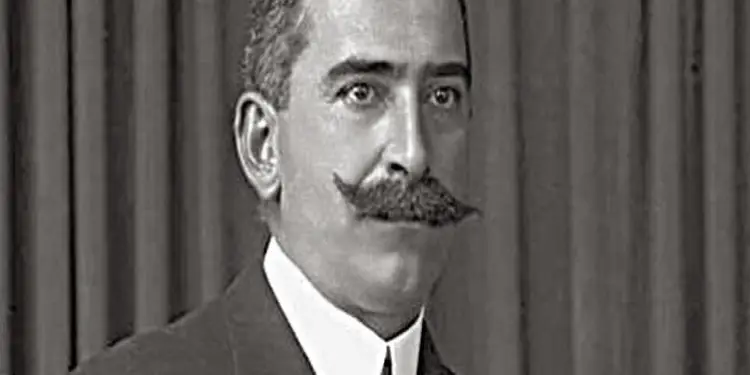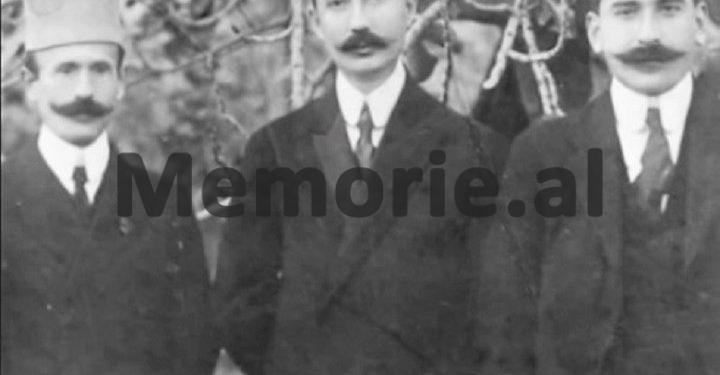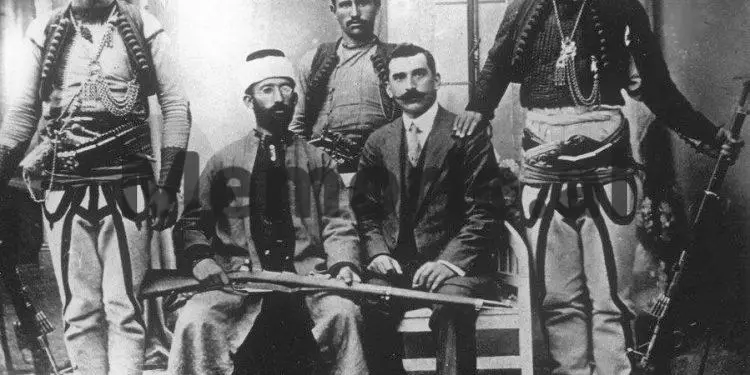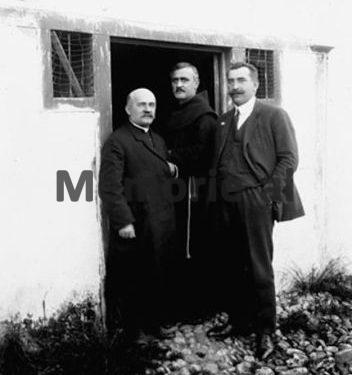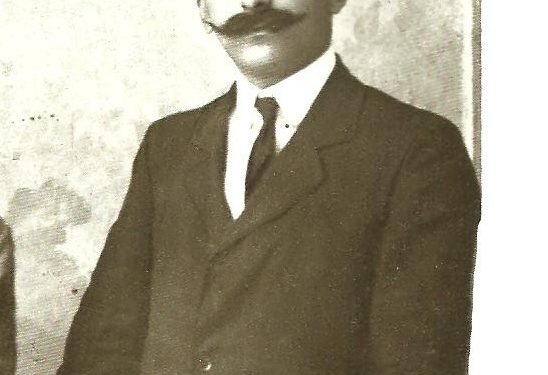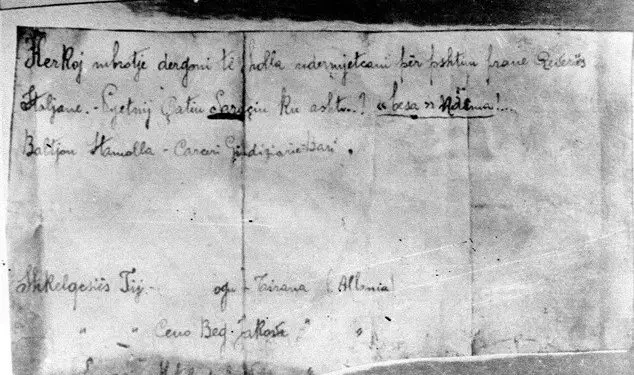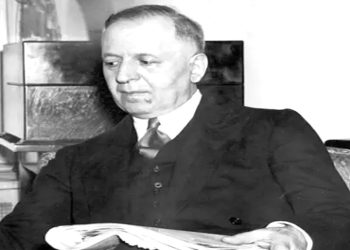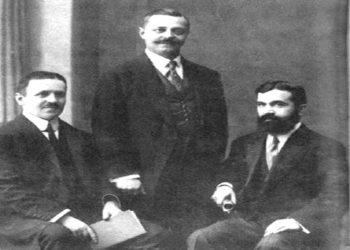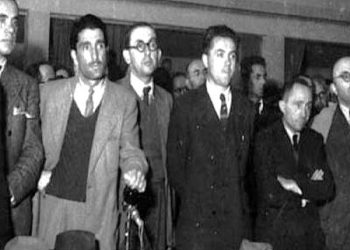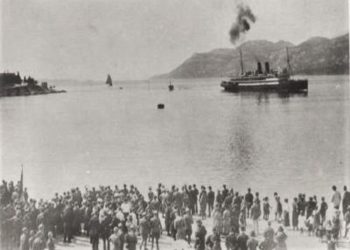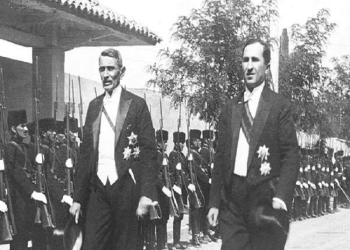Memorie.al / Luigj Gurakuqi is one of the most distinguished personalities of our patriotic and democratic, educational and cultural movement at the end of the National Renaissance and the beginnings of Independence. A towering, multifaceted figure: Luigj Gurakuqi was a politician and diplomat, an eminent statesman, a linguist, poet and prose writer, an aesthetician and literary critic, a pedagogue and textbook author, an economist and financier, an orator, a man of culture and science, of word and deed, of the pen and the rifle; in his writings, he used the pen names Jakin Shkodra and Lek Gruda. Above all, he was a great patriot, a fervent nationalist, and a co-founder of the modern Albanian state. Furthermore, Luigj Gurakuqi, like few others, experienced the most pivotal events in the country’s life in the first quarter of the last century. In most of them, he was a direct participant, and even one of the main organizers and leaders.
Family Circle
Luigj Gurakuqi was born in Shkodër on February 19, 1879, and grew up in a cultured Shkodran merchant family, to parents Pjetër and Leze Gurakuqi. His father took a special interest in his education. Pjetër Gurakuqi was a merchant with a relatively high culture, with a wide circle of friends and acquaintances among Shkodër’s merchants and intellectuals, with an active life in the city’s bazaar and trade relations with Venice and Milan. The house of this cultured and well-traveled merchant buzzed with people coming and going to discuss the troubles of the time and to hear the news of the world.
Always close to his father, little Luigj listened intently to conversations and discussions about past and present events, about the heroic wars of the people against the Ottoman invader and the Balkan predators, as well as about the men who led them. Recalling these years, Gurakuqi the student would write: “I long to be at home, and to hear father telling, as before, of the events of the Pashas of Shkodër, the bravery of the highlanders and the wars of Montenegro, things he had heard from his father and that he himself had seen much of.”
Education
He attended elementary and incomplete secondary school at the Saverian College, which was the most organized and complete school Albania had at that time. Luigj was one of the school’s most diligent students, and very soon, as early as age 13, his aptitudes for literature and literary creations appeared. He later completed his secondary education at the Arbëresh College of Saint Demetrius Corona, where he was taught by De Rada, a figure who inspired him throughout his life; he was the first Albanian student there. For 2-3 years, he studied medicine, continuing and graduating in natural sciences.
He continued his university studies in Naples (Italy) from 1901 to 1906 and successfully debuted as a lyric poet, guided by the poet of longing, Filip Shiroka, a cultivator of short prose and a publicist. With the work Vargënimi n’gjuhë shqype me nji fjalorth shqyp-frengjisht n’marim (Versification in the Albanian language with an Albanian-French glossary at the end – Naples, 1906), he made the first successful attempt at codifying Albanian poetry’s metrics. That same year, he published in Bucharest the book Abetar i vogël shqyp mas abevet t’Bashkimit e t’Stambollit me tregime n’dy dhialektet (Little Albanian Primer according to the alphabets of the Union and Istanbul with stories in two dialects) and in Naples, Fjalorth Shqyp-Frengjisht e Frengjisht-Shqyp, i fjalëve të reja (Albanian-French and French-Albanian Glossary of New Words), etc. Luigj Gurakuqi published many poems distinguished by their patriotic content, lyricism, and versification technique. With his articles, he also made a significant contribution to Albanian aesthetic thought and literary criticism.
Widespread and encyclopedic culture stands out in Luigj Gurakuqi’s personality. He was a deep connoisseur of his people’s cultural heritage and of classical Roman and Latin culture. National and world history was a constant subject of his studies. He knew archaeology and economic and financial sciences, as well as national and European educational and pedagogical heritage. Gurakuqi was a polyglot. In addition to Albanian, he mastered Latin, Italian, Turkish, and French, and knew Greek and German, and likely English as well.
Patriotic and Political Activity
After 1906, Luigj Gurakuqi dedicated himself entirely too political activity and the struggle for national liberation. In the summer of 1907, he collaborated with Bajo Topulli to organize the uprising in the North. In July 1908, he arrived in Shkodër, adored by the people, who escorted him home. In November, he participated in the Congress of Manastir, alongside the representatives of Shkodër, Father Gjergj Fishta, Dom Ndre Mjeda, Hilë Mosi, and Mati Logoreci; where he was elected vice-chairman and member of the commission for the unification of the alphabet.
Gurakuqi had the merit and fortune of directly leading the struggle for the creation of the Albanian national school and our education system. Under his leadership, the first foundations of the state primary education system in Albania were laid. The first experience of establishing Albanian educational administration was created, the first school documents were drafted, and an entire system for teacher training and qualification was built. His hand wrote the alphabets approved by the Congress of Manastir and unveiled them to the delegates. In 1909, he was appointed director of the first normal school opened in Elbasan, where he made a valuable contribution to establishing education on national foundations.
Gurakuqi has the merit of defining clearly and correctly, more than any predecessor, the concept of the Albanian national school, its content, character, and principles of construction. He demanded that the entire spirit and content of the school be in function of national goals and ideals. Gurakuqi is the most distinguished Albanian textbook author of the beginning of the last century. He provided the Albanian school with 8 textbooks, as author and co-author, totaling 738 pages.
In 1911, Gurakuqi took part in the uprising of the highlanders of Mbishkodra and, as one of its leaders, drafted, together with Mati Prennushi, the Memorandum of Greça, or the “Red Book,” as the highlander insurgents’ document is otherwise known, the gunfire of which would herald independence.
In 1912, he developed intense activity for the organization of the general uprising. He participated in the Bucharest meeting and the Declaration of Independence (November), was Ismail Qemali’s closest collaborator, and the writer of the Declaration of Independence. “For every Albanian,” Gurakuqi instructed, “November 28 should not be only a day of celebration, where everyone must analyze their own life and, hand on heart, ask themselves if they have everywhere and always done the duty they had before the homeland.”
In the Provisional Government of Vlora (December 1912), he was elected Minister of Education and established compulsory primary education for boys and girls. During World War I, with the occupation of Shkodër by the Montenegrin army, Luigj Gurakuqi was interned in Podgorica. He participated in the London Conference in 1913 with Ismail Qemali and Isa Boletini. During the Austro-Hungarian occupation, taking advantage of his position as General Director of Education and political conjunctures, he opened many Albanian schools. He was one of the founders of the ‘Literary Commission’ in 1916, where he proved to be a skilled cultivator of the Albanian language, creating, among other things, a series of new words that entered its lexicon.
Gurakuqi had a very serious and very long commitment to linguistics issues. From the beginning, he adhered to the thesis, as patriotic as it was scientific, that language is the foremost sign of the nation, the fundamental condition for its existence, and the best means for national unification. According to Gurakuqi, language and nation are one body and one soul; they are “flesh and bone.” He has outstanding merits in the development of the Albanian literary language, in the refinement of the literary language, and in the unification of written Albanian, in the stabilization of orthography, in the enrichment of vocabulary, in matters of lexicology, terminology, and grammatology. Gurakuqi is the most distinguished Albanian textbook author of the beginning of the last century. He provided the Albanian school with 8 textbooks, as author and co-author, totaling 738 pages.
Education continued to remain, as he himself said, the dearest branch of his heart. He presented very interesting ideas and opinions to the Albanian parliament on educational policy and the path the Albanian school should follow. Gurakuqi had a clear vision of the school’s role in a modern society, the individual’s fundamental freedoms and rights in education, and demanded the development of the Albanian school on legal, scientific, and pedagogical bases. Surprisingly, given his nature, he was also given the post of Minister of Internal Affairs in Hasan Prishtina’s short-lived cabinet.
He participated in the Congress of Durrës in 1918, where he was elected Minister of Education in the provisional government and a member of its delegation to the Paris Peace Conference. As early as the first meeting of the Congress of Durrës in 1918, Luigj Gurakuqi “was against mentioning the words Tosk and Gheg and Christian and Muslim in a national assembly,” demanding that such words be prohibited and adding that; “…the issue of freedom and honor of religions in Albania must be solved according to the formula: ‘Free religion, in a free state’.”
Luigj Gurakuqi elaborated on these ideas and opinions in detail in discussions in the Albanian parliament and, especially in the article “The Bases of Cooperation between Muslim and Christian Albanians.” He was categorically against those who believed that to eliminate potential religious conflicts; religious beliefs in Albania should be suppressed, by gentle or by forceful means. From 1921–1924, he was a deputy for Shkodër in the National Council, where, as one of the leaders of the democratic opposition, he fought for the democratization of the country’s life, for the relief of the farmer’s condition from heavy oppression, for economic and cultural development, and for the protection of independence from the enslaving intentions of imperialist powers. Throughout his life, Luigj Gurakuqi’s soul burned and his heart ached for the injustice done to our nation by dividing its body in half. He remained faithful until the end of his life to the ideal of seeing all the brothers of the nation united around the motherland one day.
He complained that: “They took our cities and left us the mountains; they took the most valuable lands of the homeland, leaving us like a body without a head.” The exposures Gurakuqi made of the ethnic cleansing policy pursued by Serbian chauvinists ring fresh: “The Yugoslav government will not stop at any means,” he declared, “to change the face of Kosovo.” For the extremely difficult situation of Albanians in the Yugoslav state, he blamed the Great Powers, which sacrificed Albanians and their territories for their own interests and those of their allies. Luigj Gurakuqi was an advocate for helping and upholding the rights of the population of Kosovo. He considered it an important duty of the Albanian state.
The only fault of the Kosovars lay only in the fact that they were Albanian and wanted to remain Albanian. Among Gurakuqi’s strongest speeches in parliament are those on the protection of the Albanian population of Kosovo. When the Yugoslav government, in a telegram, called the Albanian government’s concern and interest in the extremely difficult situation of the Albanians in Kosovo interference in its internal affairs, Gurakuqi, full of indignation and anger, took the floor and said:
“How can a government (Yugoslav) which has sown our lands with the graves of our brothers say that we are interfering in its internal affairs? How can a government say that we are interfering in its internal affairs, when we see thousands of children and women, due to it, wandering naked and barefoot here in Tirana, and are fed by the charity of Americans and the excesses of the army. The Yugoslav Government has no right to accuse us of such a thing, when the Albanian parliament only asks in the name of humanity and humanism, that the Serbian atrocities against Albanians be stopped.”
He actively participated in the ‘Democratic-Bourgeois Revolution’ of June 1924, being one of its main inspirers and leaders. In the government headed by Fan S. Noli, he was appointed Minister of Finance. He was distinguished for his high sense of responsibility and his determination and efforts to establish and strengthen the democratic Albanian state. He participated in the Geneva Conference, alongside Noli, in 1924.
When in Parliament, Ali Këlcyra remarked on his liberal stances, Luigj replied: “Mr. Ali Këlcyra told me, as a reproach, that I am a liberal. I thank him and he can be sure that death will separate me from my liberal opinions.” Declaring himself a democrat and liberal, Gurakuqi said that; he was neither a revolutionary nor a Bolshevik nor a socialist, concepts which in the 1920s were equivalent and meant changes by violence, by the force of arms, by uprising. Gurakuqi was for the peaceful resolution of problems, through laws, solutions; “with justice and gently.”
As such, he was against leading the people onto the path of armed uprising. Holding these concepts on the role of law, and peaceful resolution and not uprising and violent resolution of problems, Gurakuqi became involved in the 1924 Revolution only after strong hesitation and opposition. “Gurakuqi was pulled into (the revolution), after a strong opposition. They can testify that they were in Vlora,” wrote Stavro Vinjau.
In the memoirs of Father Anton Harapi, it is told that just as they were preparing for the publication of the new issue of the newspaper “Ora Maleve,” a telegram from Vlora informed them about the start of the Revolution. After Father Harapi asked what had happened, Gurakuqi had replied; “They put us out, Father Anton: look, our deputies started the revolution there in Vlora… so it’s useless to cry: we must be in solidarity with the comrades, let’s start too.”
Father Anton Harapi reinforces Luigj Gurakuqi’s above stance further: “On the day of his departure from Albania, to the question, ‘How did you fail like this and are now leaving Albania?’, Gurakuqi, flushed and stammering, with tight lips, replied: ‘Father Anton, they discredited us very badly, they declared us communists in the opinion of Europe’.” Father Anton Harapi concludes that; Gurakuqi, out of loyalty and manly integrity, was able to act even against his own conviction. Nevertheless, this is one of those moments when Luigj Gurakuqi abandoned his “middle line.”
The Assassination
After the suppression of the ‘June Revolution,’ he went to Italy, where on March 2, 1925, he was assassinated in Bari by Baltjon Stamolla, at the door of Hotel “Cavour,” said to be a cousin of Çatin Saraçi, but occasionally described as Luigj’s own cousin. It was the evening of March 2, in the hotel restaurant; Luigj Gurakuqi was having dinner with two of his friends and the wife of one of them: Riza Dani with his wife, Makbule, and his brother, Dan Hasani. He asked 1for leave from them, presenting the reason: “I will go to Sotiri’s, as I promised his daughter a doll.” Ahmet Zogu, Ceno Kryeziu, and Çatin Saraçi had a hand in the organization of this assassination, as shown by the letter sent by the killer requesting help:
“I request protection, send money, intervene for salvation with the Italian Government. Ask Çatin Saraçi, where is he…? “Besa” (honor/oath) help! Baltjon Stamolla – Carceri Giudiziarie, Bari.
His Excellency, Ahmet Zogu Tirana (Albania)
His Excellency, Ceno Beg Jakova (Gjakovë)
Çatin Saraçi, Hotel de la Ville…”
His friend, Hasan Prishtina, would express himself over his grave: “Sleep peacefully, Gurakuq, we will take your revenge with the progress of Albania.”
Mentality and Works
In his philosophical worldview, Luigj Gurakuqi was an objective idealist. He maintained liberal views towards religion and religious practices, keeping away from any religious fanaticism. But Luigj Gurakuqi was not irreligious either. He accepted the existence of God as the creator of the universe. According to him, “God is a being who has neither beginning nor end, that nothing can be compared to him, because:
“…the sky and the earth, the vast fields,
The high mountains, the great seas,
All got creation from God,
Who knows no neither measure with him, beginning nor end”!
It is this omnipotent God in whom Gurakuqi has hope and faith, that he will take the destinies of Albania and the Albanians into his hands, that he will bless their work, and fulfill their desire for freedom and independence. The dialectic of development is among the most rational aspects of objective idealis2m. Luigj Gurakuqi accepted the principle of the development of the world, of nature, of society, and of the human spirit, that everything in the world “changes constantly,” that “the world is like a wheel, turning endlessly,” and that “only the worm-eaten fatalists tremble from progress… they are satisfied to remain forever in a state of stone and lifelessness.”
Although he was not religious and maintained liberal views towards religious practices, Gurakuqi valued the role of religion in individual and social life. According to F. Noli, “he stood so far from narrow religious fanaticism that the Muslims of the North had unlimited faith, so much so that in Ghegeria, there was no other leader who united around himself Catholic and Muslim Ghegs. He was so little regionalist that when the national issue arose, there was no Gheg patriot as beloved among the Tosks as Gurakuqi.”
Throughout his life, Gurakuqi had excellent relations with all the leaders of religious communities who fought for a free Albania. On September 26, 1913, the Abbot of Mirdita sent a telegram to Gurakuqi, Minister of Education of the Provisional Government, in Vlora, writing: “I beg you to embolden the Commission of the Vlora meeting, and shake the hand of the Chairman of the Provisional Government, for the unity and the pledged faith we have with them, in all good works for the victory and flourishing of Albania. Today is the day to look upon even opposing Albanians as brothers and, in a brotherly manner, to bring them closer to the defense of the Fatherland, under the shadow of Ismail Qemal Bey and those men who know and honor the flag of Albania. I wish health and life, and good fortune, to all those Albanians, who with deeds of wisdom, faith, and love, show themselves worthy of the care of Europe, which strives to rebuild and empower our Fatherland.”
The patriotic and democratic, educational and cultural movement gave Luigj Gurakuqi’s personality the weight of nationwide dimensions, making him an extremely authoritative and trustworthy figure, even in the most difficult and delicate matters for the fate of the homeland. Luigj Gurakuqi gave everything to this movement: all his physical and mental strength, he sacrificed his youth, the joys of life, his soul, and his blood. He was ready to fight and be killed, not only for Shkodër, which he loved dearly, but also for every corner of the land called Albania. From Paris, in December 1919, when the fate of Gjirokastra was threatened, he wrote to Myfit Libohova; “I am ready, if necessary, and it is deemed advisable, to come and be killed for Gjirokastra, and for the honor of the homeland.”
Luigj Gurakuqi has the merit of being among the main authors of the educational and cultural program of our national movement for autonomy, freedom, and independence. In this context, he was the best connoisseur and propagandist of our people’s traditions, cultural and patriotic traditions, oral and written tradition, and our people’s psychology. The core of his stance in this field is the idea that; one must not deny the ancestors, the predecessors, because otherwise, we will not be Albanian, we have no one to follow and no one else to be inspired by. By fiercely propagating the traditions of our people, he had a clear goal: Albanians should know their own values, know and appreciate the values of their blood. Gurakuqi strove to give the most realistic view possible of Albania.
Therefore, he also pointed out the flaws and mistakes of the Albanians, calling on them to fight and correct them. He was particularly concerned about the custom of blood feud. He condemned it as a harmful act and as a means of inciting division among the Albanian people by foreigners. As a creator, Gurakuqi had excellent relations with the intellectual elite of the country. Luigj Gurakuqi dedicated some of his works and creations to Gjergj Fishta, Prenk Doçi, Hilë Mosi, and Mati Logoreci. But quite a few dedications and devotions are also addressed to Gurakuqi. Just like Filip Shiroka, Hilë Mosi continues to call him a “nightingale in its sound” in the piece dedicated to him; “S’kndôn bylbyli” (The Nightingale does not sing). Gjergj Fishta dedicates his work, “Pika e voeset” (The Dewdrop), to him. Memorie.al




